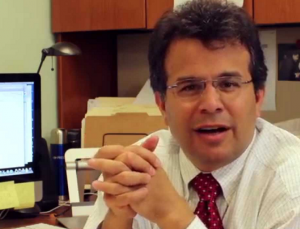PROVIDENCE, R.I. - January 12, 2016 - Chris Lehmann, a high school principal named by Technology and Learning Magazine as one of the 30 most influential people in educational technology, is confirmed as the keynote speaker for the fourth annual Summer Institute in Digital Literacy, to be held on the University of Rhode Island's Providence campus July 24 - 29, 2016.

As the founding principal of Science Leadership Academy, a progressive science and technology high school in Philadelphia, Chris Lehmann helped bring inquiry learning and project-based learning to this 1:1 laptop school. Winner of the McGraw Prize in Education, Chris was also named Outstanding Leader of the Year by the International Society of Technology in Education (ISTE). Chris received his B.A. in English Literature from the University of Pennsylvania and his M.A. in English Education from Teachers College, Columbia University and he has co-authored the book, Building School 2.0: How to Create the Schools We Need.
This summer, Lehmann joins Professors Julie Coiro and Renee Hobbs, two University of Rhode Island professors on a mission to help every student in the United States develop the new digital and media literacy skills they need to be prepared for the knowledge economy. During the week of July 24 - July 29, 2016 more than 150 K-12 and college teachers, librarians, media professionals, youth media advocates and researchers will gather in Providence on the URI-CCE campus for the fourth annual Summer Institute on Digital Literacy, one of the nation's premier professional development programs for educators. Registration for the program opens on January 13. The program, co-sponsored by URI's School of Education, the Media Education Lab and URI Providence Special Programs is designed to help educators advance students' literacy and learning by using digital texts, tools and technologies together with innovative instructional strategies that motivate and engage students' critical thinking, creativity, collaboration and communication skills.
"We're expanding the concept of literacy to address the world that our students are living in now," said Renee Hobbs, professor and director of the Media Education Lab at URI. "We need to cultivate teacher leadership and Chris Lehmann is an outstanding role model for leadership in education," she said. Hobbs and her colleague Julie Coiro, an associate professor of education and a leading expert on online reading comprehension, are co-directing the Summer Institute. They have launched the Graduate Certificate Program in Digital Literacy, the first in the nation to provide advanced training in digital literacy for educators, librarians and media professionals. This program includes participation in two summer institutes and two fully-online graduate courses over a 12-month period.
"Today, students need to be able to find, gather, use and share information using the Internet and they need to analyze and evaluate the messages they encounter," said Julie Coiro, who is one of the nation's leading literacy researchers with a special expertise in online reading comprehension and the integration of technology in education. "Students need to access, comprehend and synthesize information and ideas that use language, images, sound and multimedia. Students need to learn to create and compose using media tools. We're preparing teachers who can advance students' ‘reading' and ‘writing' skills in all the many forms that they now encounter-through tweets, YouTube videos, blogs and much more," she said.
According to Renee Hobbs, digital literacy is growing in importance because educators, government leaders and members of the business community are recognizing the relevance of these skills to future citizens and workers. Over the past four years, more than 75% of participants rated the Summer Institute the "best ever" professional development program in their entire career. Participants enrolled in the Summer Institute from 15 U.S. states and around the world, including educators from eight countries.
But the Summer Institute in Digital Literacy is definitely not just another educational technology conference, notes Coiro. Instead, the program examines both the opportunities and the challenges of living and working with new digital media tools, and their utility in the context of K-12 and higher education. "There's real momentum for digital literacy within the education community and in other education-related sectors, including higher education," Coiro said.
"Teachers will finish the week-long program inspired with a clear vision of how to activate students' skills as authors and audiences, ready for full participation in society," said Coiro. By learning for themselves how digital tools promote critical analysis, creativity and self-expression, teachers advance in their own careers as reflective practitioners and professionals. "The diverse knowledge community that comes together for the Summer Institute enables us to engage -- as researchers, learners and teachers - in preparing students for the world outside the classroom," said Hobbs.